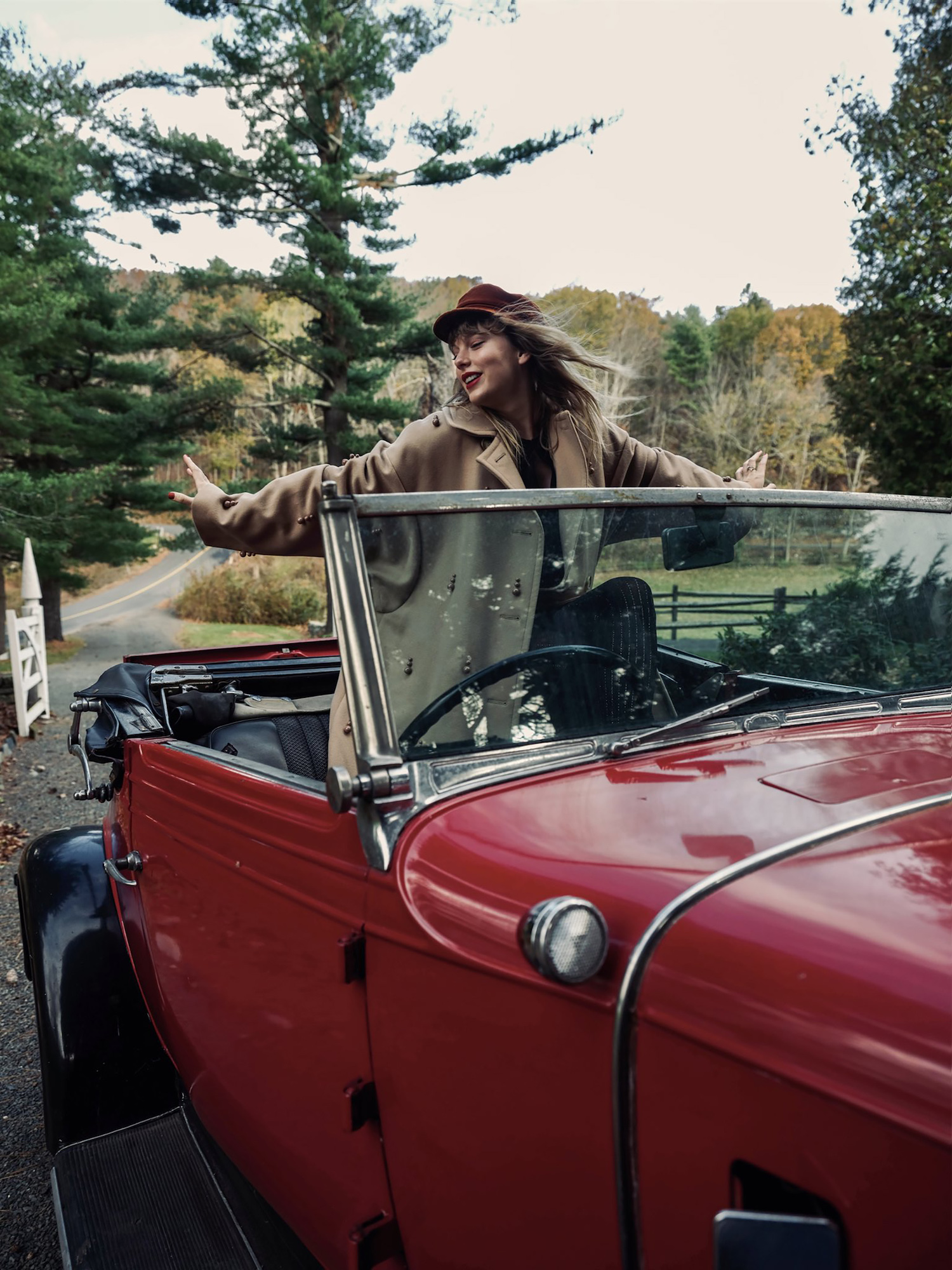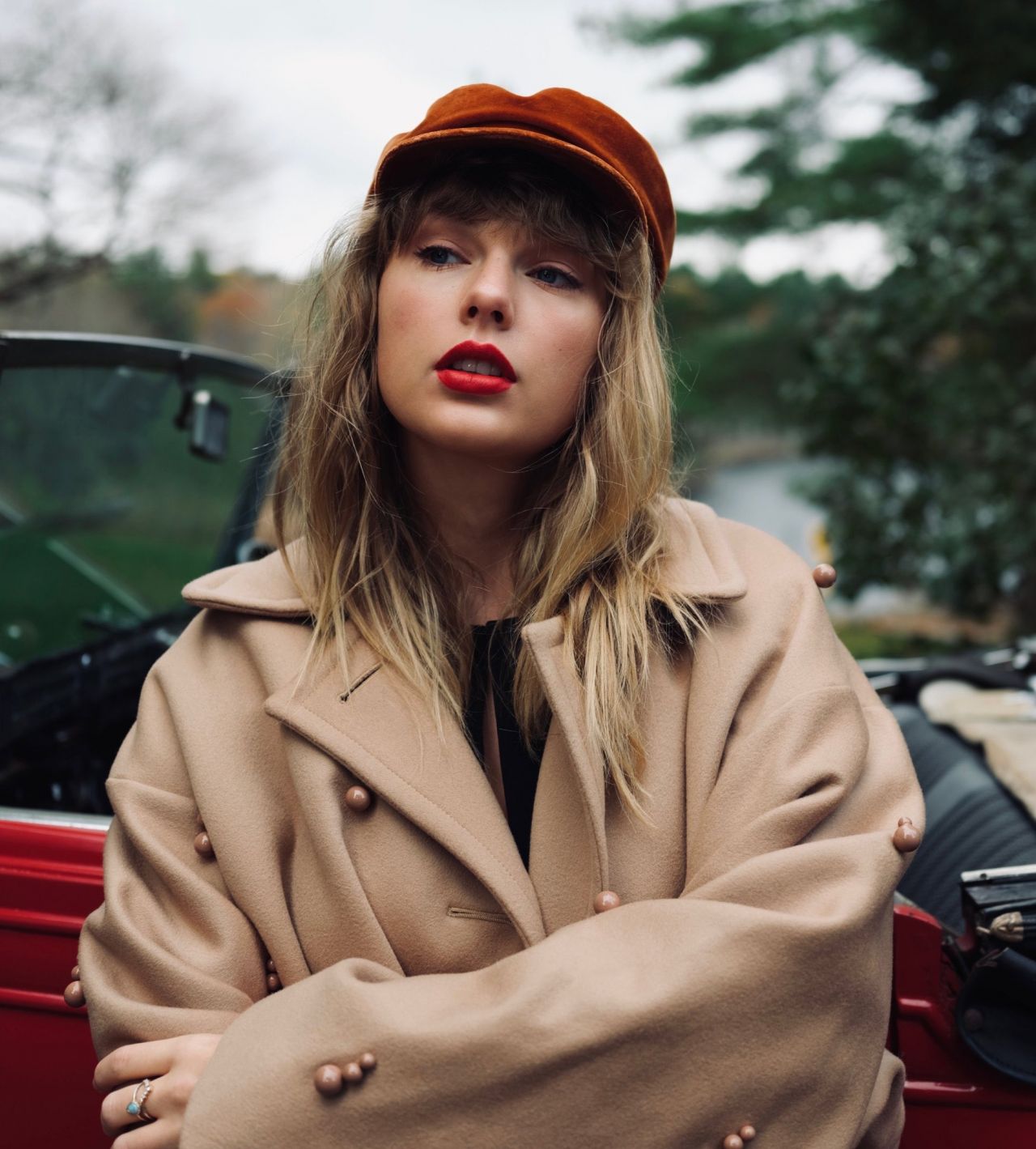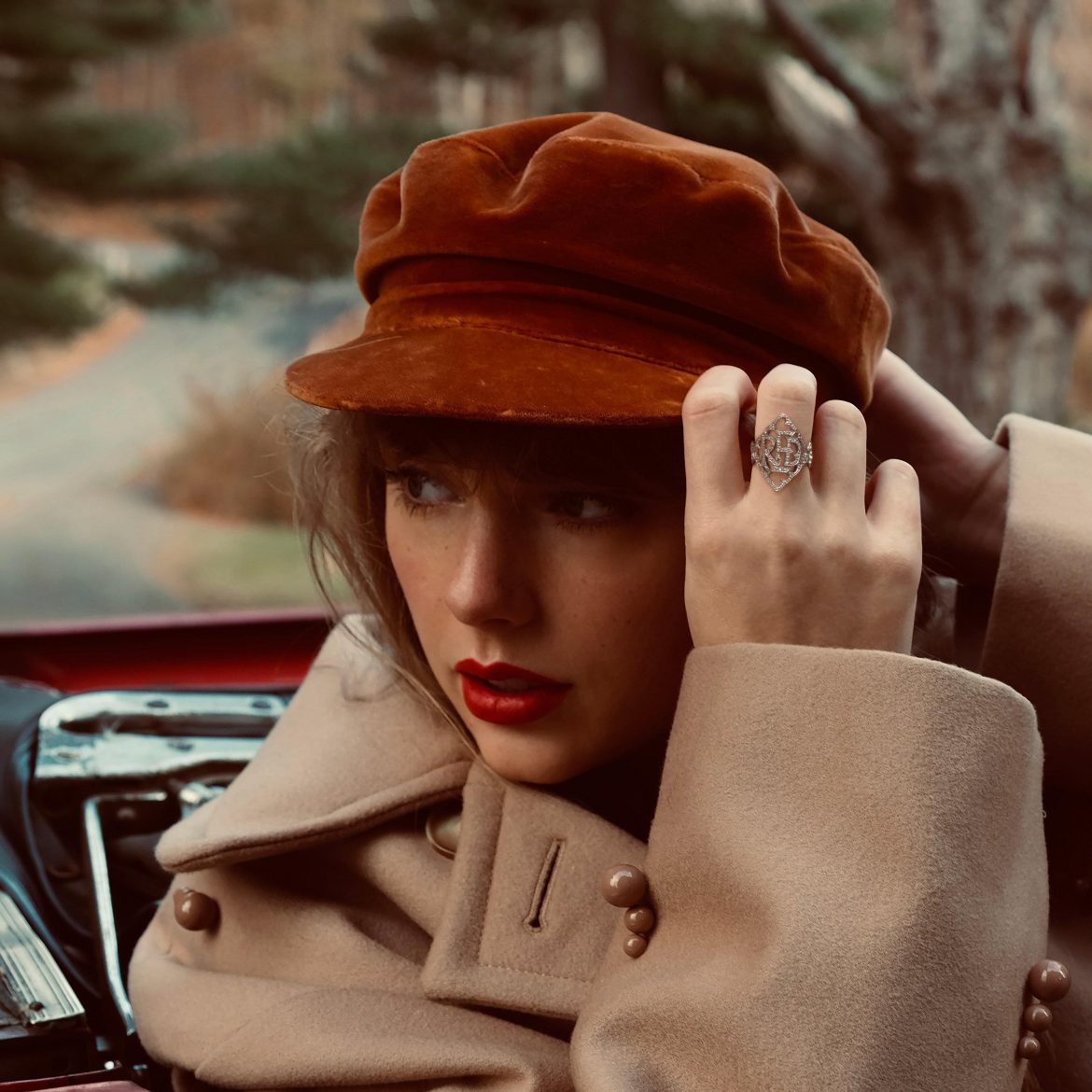Atwood Magazine’s writers discuss the highlights, the nuances, and the sheer impact of ‘Red (Taylor’s Version)’, Taylor Swift’s second re-recorded album – an ambitious project that hits home while going above and beyond all expectations.
Featured here are Atwood writers Josh Weiner, Nasim Elyasi, Nina Schaarschmidt, and Mitch Mosk.

— —
To start, what is your relationship with Taylor Swift’s music, and what is your relationship with the original 2012 Red album?
Josh: I first discovered Taylor Swift’s music in high school in the late ‘00s, around the time the Fearless album was released. A few years later, in 2012, I remember being a rising junior at Tufts University in the summer that “We Are Never Ever Getting Back Together” made its way to the radio. The accompanying album came out that same October, and along with the frenzy of the U.S. presidential election, Red is one of the two main items that epitomize that autumn for me in retrospect.
Nasim: I was seven when “You Belong With Me” came out, and it’s still one of my favorite songs today. The first time I started to properly listen to Taylor was Red, and it had a hold on me for two years. Red was pivotal for me as a young girl because it was a departure from Taylor’s sound, and it explored a different melancholy in her songwriting. It stuck with me as the first proper record I can trace throughout my life.
Nina: I must have been 14 around that time. I remember walking into a CD shop (would be considered vintage these days in times of Spotify) and buying the record. Also “we are never getting back together” was the only song I had on my iPod and my favourite song back then. Unlike many, I didn’t attach a heartbreak to red, probably because I was so young. I saw the vibe of the record more than the sad lyrics. I danced to it the whole time, which is in retrospect, a very nice thing.
Mitch: I always had respect for her ability to bridge genre divides and the disparate worlds of country and “mainstream” pop (whatever that means), but Taylor Swift finally made a true fan out of me with 1989. That album released right around my 22nd birthday – right after college – and became an instant personal favorite, still to this day – playing on repeat for me throughout the next year and beyond. Admittedly, I didn’t know Red all too well (excuse the pun) when it came out, and I probably didn’t play it all the way through until long after 1989‘s release – I just wasn’t a fan back then – but thanks to radio repeats and hearing songs at parties, I (albeit unwillingly) to this day know most, if not all the words to songs like “I Knew You Were Trouble,” “22,” and “We Are Never Ever Getting Back Together.”
But those are just the singles, and as I’ve gotten to know Red better over the past few years, I’ve grown a special fondness for the sheer unadulterated energy in “State of Grace” and the intimate, heart-on-sleeve emotion of “Sad Beautiful Tragic.” Red houses a lot of Swift’s coming-of-age self-reflections as a young 21 and 22-year-old, and in these songs you can hear her reckoning with those two inner identities – the child growing up, the young adult trying to navigate her place in the world. I really appreciate Swift’s willingness to share those deeper moments of introspection with us; as a lyricist and songwriter, there’s no denying some of these songs’ balance of catchy and creative. Red is also the beginning of a definitive sonic shift away from Country, and as someone who grew up on rock and alternative/indie music, I appreciate those moments where Swift goes full pop/rock and ditches the twang altogether.
So yes, I’m late to the Red party, but for what it’s worth, I think I’m more onboard with this album now than ever before.

What are your immediate reactions to Red (Taylor’s Version)?
Nasim: I was nervous to listen because I love the original so much! I loved how Taylor held true to the original, and this rerecording helped me understand the album through Taylor’s (and my own) more mature lens.
Josh: It was a bit jarring to hear an artist release a cover album of her own music, but I quickly came to embrace this release as such. It’s definitely great to have one of the defining pop albums of the 2010’s return in a new-yet-familiar format like this.
Nina: I loved it. Her voice has matured so much and it is beautiful to hear the songs again in a different period of life.
Mitch: Mind-blown. Swift is so clearly in the prime of her life, and like Nina said, her voice sounds utterly phenomenal. She’s strong, self-assured, and can hit all the notes while emoting a tidal wave of emotions. I love her willingness to self-edit a decade later, as well – changing certain lyrics to add more color, feeling, and depth to an already multi-platinum collection. For me, hearing the album’s first two songs – “State of Grace” and “Red” (again, two of my favorites), was all I needed to reaffirm Swift’s pure talent. The instruments hit hard, and her voice is sublime – a testament to mindful, high production quality and raw skill at work.
Swift’s passion for her craft is so apparent, as is her dedication to this wildly ambitious re-recordings project. I can’t name a single other artist who’s even tried to do what Swift is doing. Yes, having a net worth of over a half billion gives her tremendous cache (and cash) to invest in herself and reexamine her past, and the pandemic giving her so much time away from touring provided an important chance to prep, coordinate with a team, and get in the studio. You have to be all-in for this sort of endeavor to really work, and Swift is so very clearly all-in.
I’m also genuinely impressed, from a music professional’s perspective. Think about it: In the past sixteen months, Taylor Swift has delivered not one, not two, but three full-length studio albums. It’s hours upon hours’ worth of top-notch new material. To top it off, Red (Taylor’s Version) has a whopping thirty tracks (for comparison, the original studio release had sixteen – which, itself, was a big number back in its day). The back half of Red (TV) alone could be its own standalone LP, with songs like “Nothing New” (featuring indie folk-gone-mainstream darling Phoebe Bridgers) and the electro-pop forward “Message in a Bottle” (written by Swift, Max Martin, and Shellback) making for some incredible new additions to the Red repertoire.
How do you feel Swift’s re-recordings compare to her 2012 originals?
Josh: They’re very similar. Swift’s voice naturally sounds more mature, because she was 23 years old when Red first came out and those digits have now switched order. Other than that, the material that was on the original release of Red is near-identical this time around, because that is what it was meant to be.
Nasim: Hearing the difference in Taylor’s voice was a real treat. I also like the instrumental changes, they lean towards a rock sound rather than the shades of country that lingered from her earlier releases. I’m glad the re-recordings were similar as they didn’t overshadow the original, they honor it.
Nina: I prefer the re-recorded versions to the originals, since her voice sounds a lot more mature now. Also I love that they basically sound identical.
Mitch: I like how Nasim put it; they don’t overshadow, but rather honor the original. If the point of this album is to give fans the space to enjoy one of Swift’s earlier records in a manner that supports the artist, rather than the folks who currently own the rights to her original masters, then Red can surely be considered an all-around success. The fact that 26 songs from the album charted on the Hot 100 upon the album’s release, and that “All Too Well (Taylor’s Version)” became the eighth #1 song of her career (and the longest #1 song of all time) underscores Swift’s cultural relevance, as well as the strength of her nearly ten-year-old art. I don’t think Red (TV) would have fared this well if it wasn’t already a great album; the fact that it’s over-performed, and in many ways brought so many of these songs back into our lives, speaks to this music’s enduring strength. Swift is riding the zeitgeist, and she’s making the most of seemingly every moment without “tampering” with or altering her past art. Red (Taylor’s Version) is truly a heartfelt embrace of its predecessor.

Do any tracks stand out to you and why?
Nasim: Ten-minute “All Too Well” aside, “Nothing New” and “Forever Winter” are two of my current favorites.
Josh: That’s kind of a tricky question. I have a handful of favorite tracks from Red, and they are also my favorites from Red (Taylor’s Version). Because the re-recordings are so similar to the originals (minus older Swift’s developed vocals), they haven’t really changed my existing impressions of the album itself.
Nina: The ten minute version of “All Too Well,” which is the best breakup song possibly ever written- at least for the experience she captures within the lyrics.
Nasim: The bridge to “Treacherous” is [also] amazing, it explodes but in the most controlled and colorful way. “Babe” has been in my head for days, I walk around campus whispering “promises, promises.” Another Vault track I like is “Message In A Bottle.” It’s another Taylor collab with Max Martin and Shellback. It reminds me of Robyn’s discography, which is always a plus. And “All Too Well” forever.
Mitch: “State of Grace” hits me like a wrecking ball. The introductory drums are crisp, those electric guitar strums are emphatic and resounding, and Swift sounds like a rock star. It’s unapologetic, high-energy, uplifting, and irresistible. While I don’t disagree with Josh’s assessment that the re-recordings are true to the originals, I can’t help but feel like the new version is slightly brighter and even more buoyant than the original. Yes, I’m biased, and yes, what do I know – it’s all on a “feels” basis, but this was the first song I heard off the re-recorded Red album, and it’s the one that’s stuck with me the longest.
We can’t talk about this album without addressing the ten-minute “All Too Well.” What do you think of this extended version?
Josh: No, we certainly cannot! It’s not too often that a song that was never formally released as a single becomes the one for which its parent album is perhaps best remembered – especially when that same album produced six Top 40 hits. That goes to show what sort of powerful impact “All Too Well” has had on the Swiftie community and, by extension, how deserving this song was of a 10-minute treatment. It was kind of jarring to hear the new lyrical passages stitched into the original ones, but after a few listens I got the hang of it, and now I’ve come to readily accept “All Too Well (10 Minute Version)” as one of the primary attractions of the re-recorded Red.
Nasim: I could write a book about this song. I never thought Taylor would release this version, and I didn’t think it would shock me as much as it did. I also grew to recognize the importance of “All Too Well” to all the fans. I think the song is impressive as a testament to Taylor’s songwriting ability, and it’s why I became a fan in the first place. I didn’t think I would enjoy the ten-minute version as much as the original, but it holds up. They’re almost two completely different tracks even though they tell the same story.
Nina: I have nearly waited a decade to hear this, and it’s so beautiful, raw and honest. It shows that she’s a master of the craft.
Mitch: Hey, it’s no “Alice’s Restaurant,” right? In theory and on paper ten minutes is certainly a lot, but who among us hasn’t wanted to include everything in a song, only to be stifled by our own self-imposed standards, pop music’s expectations and demands, or a record company solely interested in short n’ sweet three- to four-minute hits? The music world of 2012 was still run by radio, and a ten-minute pop song wouldn’t have broken through. I don’t think that’s the case anymore, and I think this version’s success speaks to how powerful on-demand streaming really is.
So in short, I get why Swift did it, and I do see the appeal of this fleshed-out narrative. The song now has a full story with its own beginning, middle, and end: What I’ll say is that I have ADD, and I still sat through all ten minutes of “All Too Well.” I even sat through all fifteen minutes of All Too Well: The Short Film (some of those scenes are really gripping!). I don’t often have the patience for these sorts of things, but Swift did in 10 minutes may many artists can barely do with 60 seconds: She kept us hooked.
What effect do you see Taylor’s re-recordings making on the industry as a whole, if any?
Nasim: It’s pretty crazy that an artist of this rank has issues with owning her own music. Taylor is a household name, and I think the re-recording will at least start a conversation about the music industry with people who are not as familiar with these situations.
Josh: Probably not as much as you might expect. My father, who’s a lawyer, explained the reasons for the re-recordings to me in legalese, and I wouldn’t count on this being a scenario that replays itself all that often. This is not just because of how few singers these days are of Taylor Swift’s megawatt stature, but also because the music industry now knows how to avoid the sort of tangled situation that the teenage starlet of Big Machine Records got into years ago. In short, don’t hold your breath waiting for The Fame Monster (Gaga’s Version) et. al. to be released.
Nina: I hope a lot will change, but in reality, a lot will probably remain the same.
Mitch: I think Swift has the power, time, and money to attempt this kind of massive undertaking and follow through on it (as I said earlier, the pandemic’s touring pause has probably sped up her timeline and helped her immensely in this arena), but I don’t think she is necessarily paving the way for the next generation to do the same. This is a last-ditch effort to make her music her own when the reclaiming her rights failed. No one should want to do this, ever – and again, it’s a testament to Swift’s work ethic and talents that everything is coming out sounding so good that people would rather listen to “Taylor’s Version” of everything! Remember, if it weren’t all A+ material, it wouldn’t matter – folks would revert to the original records they already know and love. What I will say is that the sheer act of rerecording all this material means that, should anyone even find themselves in a similar boat and consider this avenue in the future, they can look to Swift as a pioneer and a trailblazer. I sincerely hope her efforts pay off for her, but. I wouldn’t wish this on anybody.
There’s a good amount of new material here. What are your impressions of it? How does the album function as a two-hour collection of all the songs Swift had originally conceived for Red, versus the tailored (pun intended) hour-long version that came out in 2012?
Nasim: I think of these re-recordings as a little treasure chest, especially for Swifties. I don’t think many people are setting two hours aside to listen to the record, but fans have their eye out for certain tracks. I appreciate the original more now, seeing what Taylor cut out and why she did it. I enjoyed the Vault tracks, specifically “Nothing New” and “Forever Winter.” I think Red holds up, and the re-recording will be as much a touchstone for listeners as the original.
Josh: Two-hour albums don’t always escape my critical eye. Even as a massive OutKast fan, I have problems with Speakerboxxx/The Love Below’s 135-minute runtime, for instance. By extension, I don’t think the album would have functioned as well upon its initial release with all 30 of these tracks, and I’m glad that Swift stuck with 16 of them when Red originally came out in 2012.
That said, in hindsight, it’s now very interesting to get a full impression of everything that was in Swift’s mind during the Red era via the additional material that’s been included in this release. I’m a fan of pretty much all of the new songs, with special praise going to the energetic “Message in a Bottle” and “Forever Winter,” as well as her effective collaborations with Phoebe Bridgers and Ed Sheeran. A two-part listening session may be the best way to make my way through all of this bulky content, but there are more than enough rewards to be reaped along the way.
Nina: Especially with the vault tracks, I think it shows a wider perspective of what she went through in the “red” period of her life. The original album is a record for the heartbroken, but this feels so much wider, since it also tackles other themes with “nothing new” or “message in a bottle.”
Mitch: I listened to the whole two-hour album upon its release, and in all honesty I probably won’t do that again for a long time – so Nasim, I completely agree with you. The Vault tracks are the most interesting for me personally, because I see those songs as an insight into the stuff that “didn’t make the cut.” I know myself well enough to know that I tend to gravitate toward the stuff that “didn’t make the cut,” at least from a mainstream pop artist perspective, and so those less-catchy but perhaps more lyrically-savvy moments, like “Run,” “Ronan,” and so on, have been fun for me.
Do you have any favorite lyrics?
Nasim: The bridge of “Holy Ground” has been making me cry for a decade: “Tonight, I’m gonna dance for all that we’ve been through. But I don’t wanna dance if I’m not dancing with you.” Also “You kept me like a secret but I kept you like an oath.” Like are you kidding? Chills.
Josh: “Go to lonely Starbucks lovers” may be the go-to misheard Taylor Swift line for most people. Personally, though, I’m also a fan of “I’m a Barbie on the boardwalk, summer of ‘45” from “Starlight” (OK, it’s actually “I met Bobby…” but still!) So, that’s enough to make that one of my favorite lyrics of off Red, but I also like all of the color metaphors on the title track and pretty much anything off of the almighty “State of Grace” and “All Too Well.”
Nina: I know, I keep repeating myself, but it’s probably every word in the 10 minute “All Too Well” version. Also, “Nothing New”:
And I wake up in the middle of the night
It’s like I can feel time moving
How can a person know everything
At eighteen, but nothin’ at twenty-two?
Mitch: The visceral new fourth verse of “All Too Well (10 Minute Version)”:
They say all’s well that ends well, but I’m in a new hell
Every time you double-cross my mind
You said if we had been closer in age, maybe it would’ve been fine
And that made me want to die
The idea you had of me, who was she?
A never-needy, ever-lovely jewel whose shine reflects on you
Not weepin’ in a party bathroom
Some actress askin’ me what happened, you
That’s what happened, you
You who charmed my dad with self-effacing jokes
Sippin’ coffee like you’re on a late-night show
But then he watched me watch the front door all night, willin’ you to come
And he said, “It’s supposed to be fun turning twenty-one”
I find it gutting, emotional, vulnerable, and real: A moment of complete surrender to the situation.
How do you feel Red (Taylor’s Version) stands in the pantheon of Taylor Swift releases?
Josh: Red and 1989 are my two favorite Taylor Swift albums (though all of them are good). I’m not even sure I’d include “Taylor’s Versions” in my rankings of her discography, since they’re not the original LPs. But I’ll say that this new version of Red is more stirring evidence of just how capable Swift is of maintaining her position at the forefront of pop culture’s attention – she’s been at it for nearly 15 years now, and still going on. Raise your glasses for that, folks.
Mitch: I’m with you, Josh. 1989 and then Red. I don’t feel the need to differentiate between Red and Red (Taylor’s Version); I interpret the re-release as the new original, and for what it’s worth, my personal order remains – but I do think I’ll be listening to Red‘s songs a lot more frequently now, than ever before. You might say I like it “all too well.”
Nasim: The re-recording gave me more to love about the record, which, in my opinion, makes the effort successful. It doesn’t overshadow the original, just gives more shades of color to the overall portrait.

– – – –

Connect with Taylor Swift on
Facebook, Instagram, Twitter
Discover new music on Atwood Magazine
? © Beth Garrabrant
Red (Taylor’s Version)
an album by Taylor Swift








